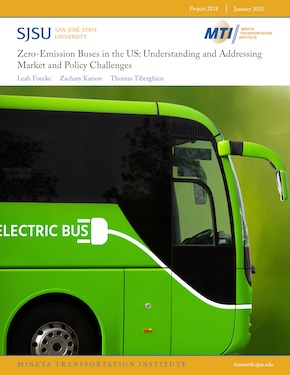- 408-924-7560
- mineta-institute@sjsu.edu
- Donate
Zero-Emission Buses in the US: Understanding and Addressing Market and Policy Challenges
As the US public transportation sector accelerates its shift from fossil fuels to zero-emission alternatives, transit agencies and transit bus manufacturers alike face significant uncertainty and instability. This report provides policymakers with updated insights into the US transit bus market, focusing on key industry dynamics, financial challenges with zero-emission bus (ZEB) acquisition, technological obstacles in deployment, and regulatory issues. The research relies on interviews with stakeholders, a detailed review of existing literature, and an analysis of US public transit data. Key findings reveal ongoing challenges related to costs, supply, reliability, and workforce development, all of which hinder the adoption of ZEBs. Specifically, challenges include the reality that purchase prices for zero-emission buses in the United States remain significantly higher than internal combustion engine (ICE) vehicles and have not declined as quickly as previously theorized. Additionally, the full-size ZEB market in the US has become highly consolidated, and most transit agencies lack capacity in terms of technical knowledge, staff, and funding required for a successful transition to ZEBs. Potential options to combat these challenges may include enhanced funding mechanisms, industry partnerships, facilitating access to supporting technologies and best practices, and undertaking initiatives to prepare the ZEB workforce. While more research is needed to support the sector's full transition to ZEBs, this report provides actionable insights policymakers can use in a rapidly evolving market to identify solution areas for further exploration and ease transit into a more sustainable future.
LEAH FOECKE, MS
Leah is a Manager at Rebel with over seven years of experience as an economic consultant and policy advisor. She brings experience advising clients at the national, state, and local level, with particular expertise in transit and transportation, zero-emission transition, and public-private infrastructure delivery. Prior to Rebel, Leah provided economic analysis, strategic advisory services, and monitoring and evaluation support to public and private sector clients as an economic consultant and held fellowships focused on climate and infrastructure with the City of Boston and the State of Massachusetts. She holds a master’s degree in public policy from Harvard University’s John F. Kennedy School of Public Policy and a bachelor’s degree in economics and biology from the University of Wisconsin-Madison.
ZACHARY KARSON, MS
Zachary is a Manager at Rebel with experience advising both public and private clients on infrastructure projects and transactions in various sectors, including mass transit and mobility, renewable energy, broadband, water, and wastewater. Zachary focuses on financial analysis, risk analysis, procurement support, and assisting clients with key commercial and financial decisions. Zachary is also a registered Series 50 municipal financial advisor. Before working at Rebel, Zachary worked for various public and private organizations in the renewable energy sector. He holds a master’s degree in public administration and a master’s degree in business administration from New York University, and a bachelor’s degree in political science and Spanish from Kenyon College.
THOMAS TIBERGHIEN, MS
Thomas is a Consultant at Rebel, where he brings his expertise in international development policy and quantitative research methods to advise clients on the acceleration of zero-emission bus adoption and infrastructure development. At Rebel, Thomas advises transit agencies on strategies to accelerate the transition to zero-emission buses. He also provides guidance to multilateral development banks and local governments on the development of infrastructure projects and public-private partnerships. Thomas holds a master's degree in International Development Policy from Georgetown University's McCourt School of Public Policy and a dual bachelor's degree in Mechanical Engineering and Applied Mathematics & Statistics from Johns Hopkins University.
-
Contact Us
San José State University One Washington Square, San Jose, CA 95192 Phone: 408-924-7560 Email: mineta-institute@sjsu.edu






